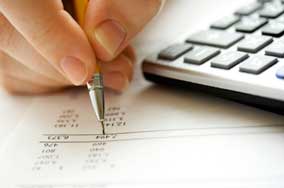

 In an ideal world businesses would keep all their receipts and invoices in a logical, coherent and easy to access manor; unfortunately thisideal does not always prevail. HMRC have cottoned onto this fact and in this age of general empty coffers they have decided that they are going to target people who fail to maintain their records and their initiative to do this will start in the latter part of 2011.
In an ideal world businesses would keep all their receipts and invoices in a logical, coherent and easy to access manor; unfortunately thisideal does not always prevail. HMRC have cottoned onto this fact and in this age of general empty coffers they have decided that they are going to target people who fail to maintain their records and their initiative to do this will start in the latter part of 2011.
HMRC under took a consultation to consider this matter in December 2010 full details can be found on the HMRC site. HMRC are not going to be introducing new legislation in order to implement this crackdown. They will be using existing laws and simply enforcing them.
What Records Need to Be Kept
Unincorporated Businesses
Records must be kept so that your Tax Return can be completed fully and accurately.Businesses at the very least mustmaintain a record of all sales and takings and a record of all purchases and expenses. If the business is also VAT registered, then VAT accounts, VAT sales, purchase invoices and import and export documents must all be kept.
The businesses or their accountant would then use these records to create a profit and loss account – which shows the sales income received and the expenses paid, and what profit/ loss has actually been made. The records must be kept for a minimum of 5 years after the normal filing deadline eg: 2009/10 must be kept until 31st January 2016.
Companies
Companies must maintain accounts records (including detailsof assets, liabilities, income &expenditure); business records (bank statements andpaying-in slips, accounts books, purchases and sales information).
Business records must be kept for minimum 6 years from the end of the Corporation Tax account period.eg: example, if your accounting period ends on 31 March 2009, you’ll need to keep the records for that period until at least 31 March 2015.HMRC have a comprehensive though not exhaustive fact sheet called to maintaining records which can be accessed from the following url: http://www.hmrc.gov.uk/factsheet/record-keeping.pdf
How to keep your records
The law does not dictate how records must be kept. .However HMRC recommend originalpaper documents that show tax has been deducted are kept eg;P60.
Other records can be kept electronically (on a computer or any storage devicesuch as disk, CD, memory stick or microfilm) as long as the method used captures all the information on the document (front and back) andallows the information to be presented in a readable format should HMRC ever need to access it.
HMRC Business Record Checks
HMRC intends to start selecting business records on the basis of risk assessments and in some cases on a random basis to identify businesses that have poor record keeping.
HMRC will give 7 days’ notice and at a prearranged time enter the businesses premises and check statutory business records where this is required to check the tax position.
The visit can take a matter of hours or in the base of a large complex business this can take several days if not more. They will typically look at a sample or the records and in some cases take some records away. If any business assets are kept at another location HMRC may also wish to visit them
If you run your business or keep stock or other assets at home HMRC should be told of this in advance. In this case the visiting inspector will only enter those parts of your home which are used for business purposes unless you invite the Inspector into other parts; which is not advisable.
A factsheet can be found on the HMRC site which states the procedures involved with such compliance checks. Please see the following: http://www.hmrc.gov.uk/compliance/cc-fs3.pdf.
Following the Visit
After the visit HMRC will “grade” the records they have seen and will rank it the quality of the records they see. The current suggested (not confirmed) ranking system is as follows
|
Good Records
|
– Documented acknowledgement of the perceived adequacy. – A potentially lower risk of future compliance checks.
|
|
Minor record keeping failures
|
– Documented explanation to the trader of the findings of the Business RecordsCheck and of the actions expected to be taken to rectify the position going forward. – A slightly increased risk of future compliance checks.
|
|
No records or significant record keeping failures
|
– Documented explanation to the trader of the findings of the Business RecordsCheck and of the actions expected to be taken to rectify the position goingforward. – The award of a penalty (see below). – The likelihood of a future Business Records Check (where the penalty forcontinued and significant record keeping failures apply) and/or and increased likelihood of other compliance interventions.
|
If a business is deemed by HMRC to have failed to maintain satisfactory records a maximum penalty of £3,000 will be imposed.
Are You Prepared
Administration and record keeping is not the most exciting part of a business however considering the potential ramifications of noncompliance it is worth considering: “are you prepared for this increased scrutiny?”, “how would your business rank”? In light of the fact HMRC are suggesting they will commence these checks in the latter half of this year it may be time to consider looking at your record keeping systems and preparing for a potential “Business Records Check” vist.
Jasbinder Bahara, of Silver Levene provided research for this article.
Disclaimer
Umesh Modi BA ACA, is a Chartered Accountant and Tax Advisor, and a partner at Silver Levene (Incorporating Modiplus+). He can be contacted on 020 7383 3200 or umesh.modi@silverlevene.co.uk

